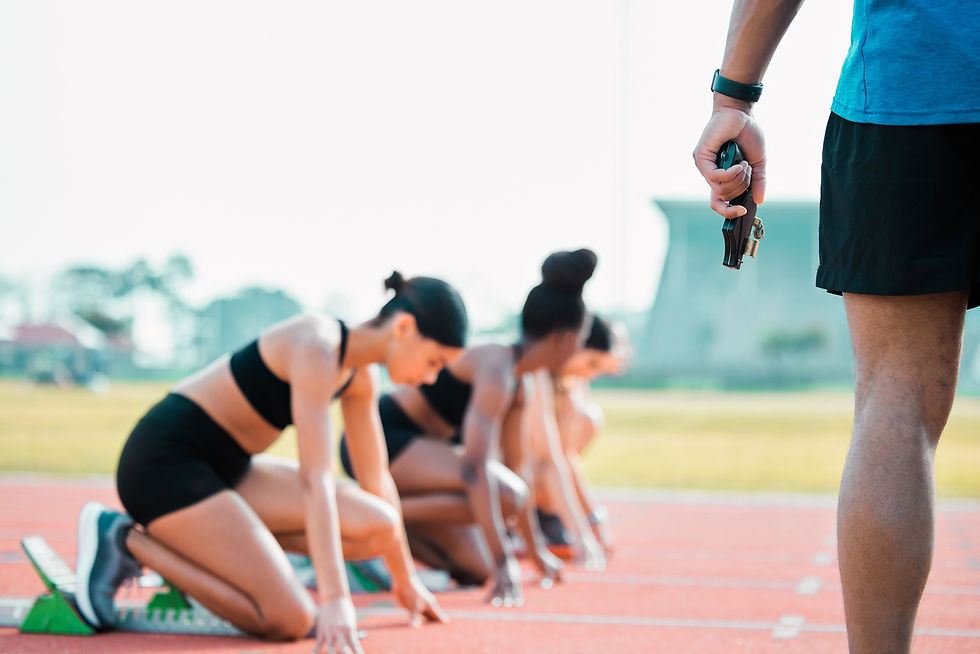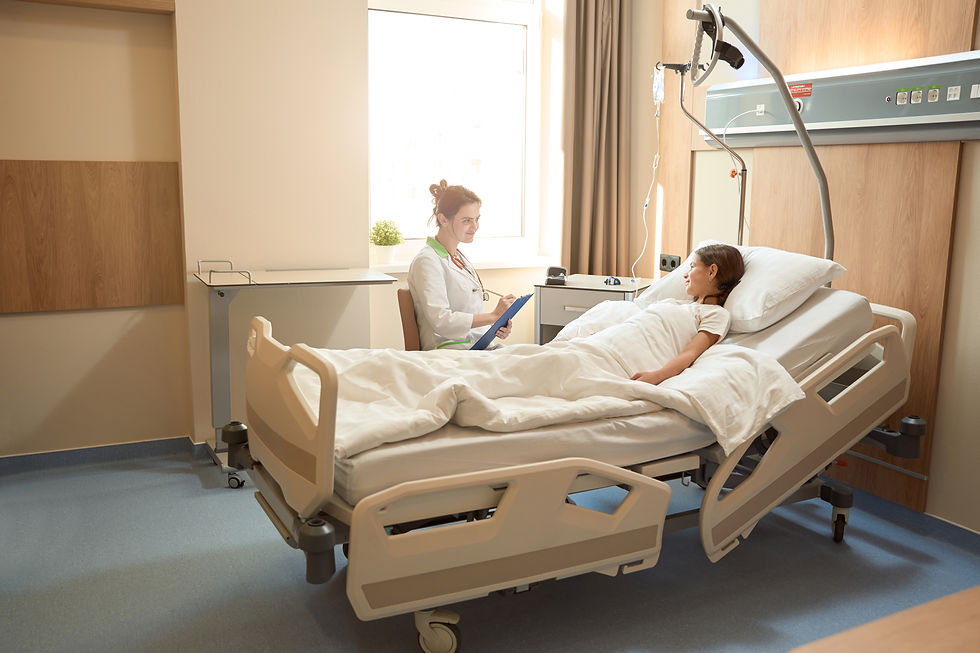Could Sleep be the Secret to Good Health?
- Sophie Bostock, PhD

- Mar 4, 2025
- 5 min read
Updated: Aug 24, 2025
7 ways that your sleep habits could unlock more energy & GOOD HEALTH
If you could do just ONE thing to improve your health, what would it be? Ideally, it would be something that is free, enjoyable, is easily repeatable and - when the conditions are right - doesn’t require a huge amount of effort!
Sleep is one of the most powerful and easy-to-apply levers that we have for improving health and wellbeing.
We often seem to read catastrophic headlines warning us about what might happen if we don’t get enough sleep. This can fuel a negative cycle of anxiety about not being able to sleep, which keeps us tense, alert and interferes with the process of falling asleep, or falling back to sleep. Instead of focusing on the negatives, I’d argue that we need to focus on the protective benefits of sleep; even a small amount can transform the way we see the world.
Sleep improves SPORTS performance
Sleeping for 7 hours or more is beneficial for a wide variety of physical performance outcomes, including speed, power, endurance and accuracy (Craven 2022). While most athletes can get through training in the morning without any ill effects, it’s in the afternoon that the effects of being well slept become more noticeable. A recent review found that even for those athletes who are able to sleep for 7 or more hours at night, getting extra sleep by spending more time in bed, or with daytime napping, could further boost performance (Cunha 2023).

Sleep improves mood
One of the most reliable impacts of a good night’s sleep is that it reduces feelings of anxiety the next day, and improves psychological wellbeing. A review of 65 different trials investigating the impact of improving sleep found reliable improvements on mental health overall, as well as benefits for anxiety, depression, rumination and stress (Scott 2021). When you are well slept, you are less reactive, and better at emotional regulation.
Sleep promotes healthier skin
During sleep, blood flow to the skin increases, which helps nourish and rejuvenate the skin. One experiment found that better sleepers had better skin barrier function, and recovered more quickly from exposure to solar ultraviolet light (Oyatakin-White 2015). Good sleepers were also more satisfied with their appearance and physical attractiveness compared with poor sleepers.
Sleep BUILDS strong bones
Our bones undergo extensive re-modelling overnight, with the removal of older tissue and the formation of new tissue. Growth hormone release peaks in the first part of the night, during slow wave sleep, stimulating protein synthesis and repair. In one large study of 11,000 postmenopausal women, sleeping for 7 or more hours per night was associated with significantly lower rates of osteoporosis than women sleeping 5 hours or less (Ochs-Balcom 2021).
Sleep BOOSTS immune function
Our immune system is hard at work whilst we sleep, and therefore protecting sufficient time for sleep can reduce the risks of infectious disease. In one study, when healthy volunteers were inoculated with the common cold, those sleeping for 7 hours per night were at the lowest risk of developing symptoms (Prather 2015). A recent analysis of studies looking at vulnerability to COVID-19 found that pre-existing sleep disturbances, especially sleep apnoea, increased the risk of COVID-19, as well as the risks of hospitalisation, mortality, and even developing long COVID (Zhou 2024). People with healthy sleep patterns were at lower risk of adverse health outcomes from COVID-19 infection.
Sleep protects metabolic health
Sleep deprivation can disrupt the hormones that regulate appetite, notably ghrelin (which stimulates hunger) and leptin (which signals fullness). We are less likely to crave unhealthy, calorie-dense foods when we are well slept. In one recent trial, researchers recruited 80 adults who were all overweight, and all typically slept for 6.5 hours or less per night. Half the volunteers were asked to extend their bedtime to 8.5 hours, and were not asked to make any other changes. After 2 weeks, those who extended their sleep time were consuming 270 fewer calories per day than those who had not changed their sleep patterns (Tasali 2022). This suggests that extending time in bed could help to support weight loss efforts.

Sleep reduces perceptions of pain
We have highlighted in a previous blog post that sleep and chronic pain are closely linked, perhaps partly due to the anti-inflammatory effects of sleep. In patients awaiting surgery, sleep quality before the operation was a predictor of outcomes 3 months later (Luo 2019). Better sleep was associated with lower pain, greater range of motion and a more rapid recovery. According to one long term study which monitored volunteers for up to 22 years, improvement in insomnia symptoms was associated with better pain outcomes (Norstoga 2022).

So, if sleep carries all of these benefits, what simple steps can we take to make sure that we get the best quality sleep possible?
Simply remember to R.E.S.T.
1. Routine: Aim to wake up at the same time as often as possible
Two independent processes make us fall asleep. Firstly, there is a sleep pressure which builds up gradually the longer you’ve been awake. Secondly, there’s your body clock, which is programmed to operate on a 24 hour ‘circadian’ rhythm. When we stick to the same wake up time and bedtime, our body clocks are more likely to hum along in synchrony. Haphazard routines, or night shifts, put more pressure on the body; we can do it, but it’s tiring. Aim to wake up at the same time within an hour, as often as possible
2. Energise naturally with light, exercise and healthy food
Bright light in the morning helps us feel alert, whereas dimming the lights after sunset triggers the release of the hormone melatonin, which signals the brain that it’s time for sleep. Exercise helps pep us up, and has the added benefit of aiding deep sleep at night. Food also sends a wake-up signal, so avoid large meals two hours before bed. Caffeine temporarily masks sleep pressure. Excess caffeine means you can lose track of how much sleep you need, and it can make sleep lighter. If you’re struggling with sleep, try switching to decaf in the afternoon.
3. Switch off from stress: wind down before bed
Parents know that a consistent bedtime routine is essential for their hyperactive toddlers, but it’s good news for adults too. Give yourself an hour to unwind - that means no more work, no phone and no bright lights. If stress is the issue, and your mind won’t stop racing, put a piece of paper and a pencil by your bed. Before you get into bed, spend 10 minutes writing down what’s on your mind. If those thoughts pop up, tell yourself they’re on the page, and let them go.
4. SEEK A COOL Temperature
Your sleep environment? Think luxury cave. Dark, quiet and cool – about 18C. A drop in body temperature is a cue for sleep. Taking a warm bath 1-2 hours before bed can promote a more restful sleep - not only does warm water help your muscles to relax, the cooling that takes place as you exit the bath could help to induce a restful slumber. Mattresses with cooling properties can also help to promote deep sleep.




Hope more people will read this article keep up the good work This Article is Awesome. It’s help me a lot. Please keep up your good work. We are always with you and Waiting for your new interesting articles Harley Quinn Red Dress
Hope more people will read this article keep up the good work This Article is Awesome. It’s help me a lot. Please keep up your good work. We are always with you and Waiting for your new interesting articles Kyle Kuzma Pink Sweater
Outstanding article! I want people to know just how good this information is in your article. Your views are much like my own concerning this subject. I will visit daily because I know It will very beneficial for me White Lotus Shirt
'Sleeping for 7 hours or more...' is a game changer! Just saw this during my coffee break, and it's got me thinking about my sleep schedule. Maybe this Michigan Paycheck Calculator... sorry, wrong tab... this SLEEP calculator can actually help me get healthier? I mean, who knew sleep could be SO powerful?
Drive Mad is a quick and entertaining physics-based challenge where smooth control is key. Successfully navigating the bizarre tracks offers a feeling of satisfying, brief accomplishment